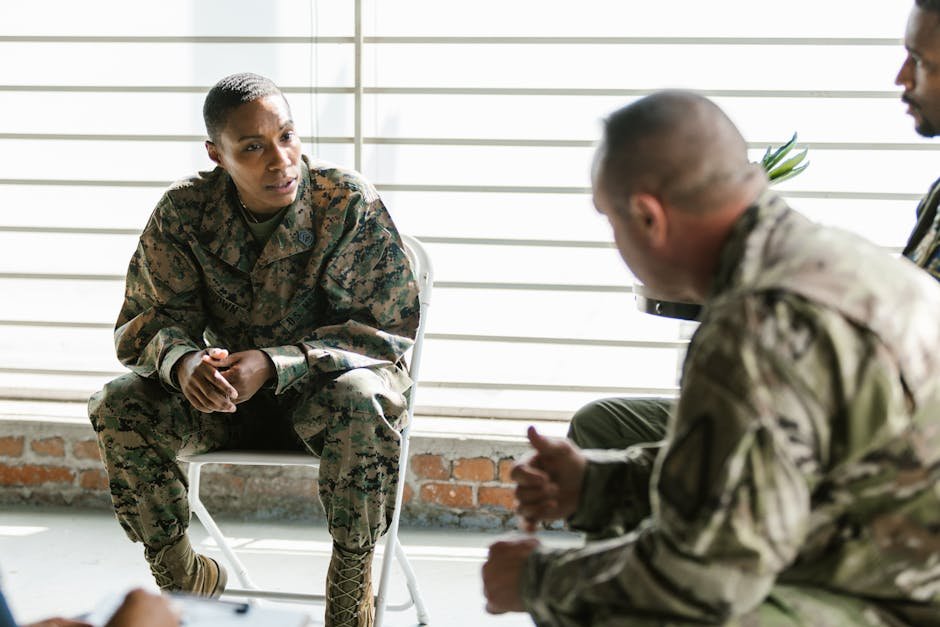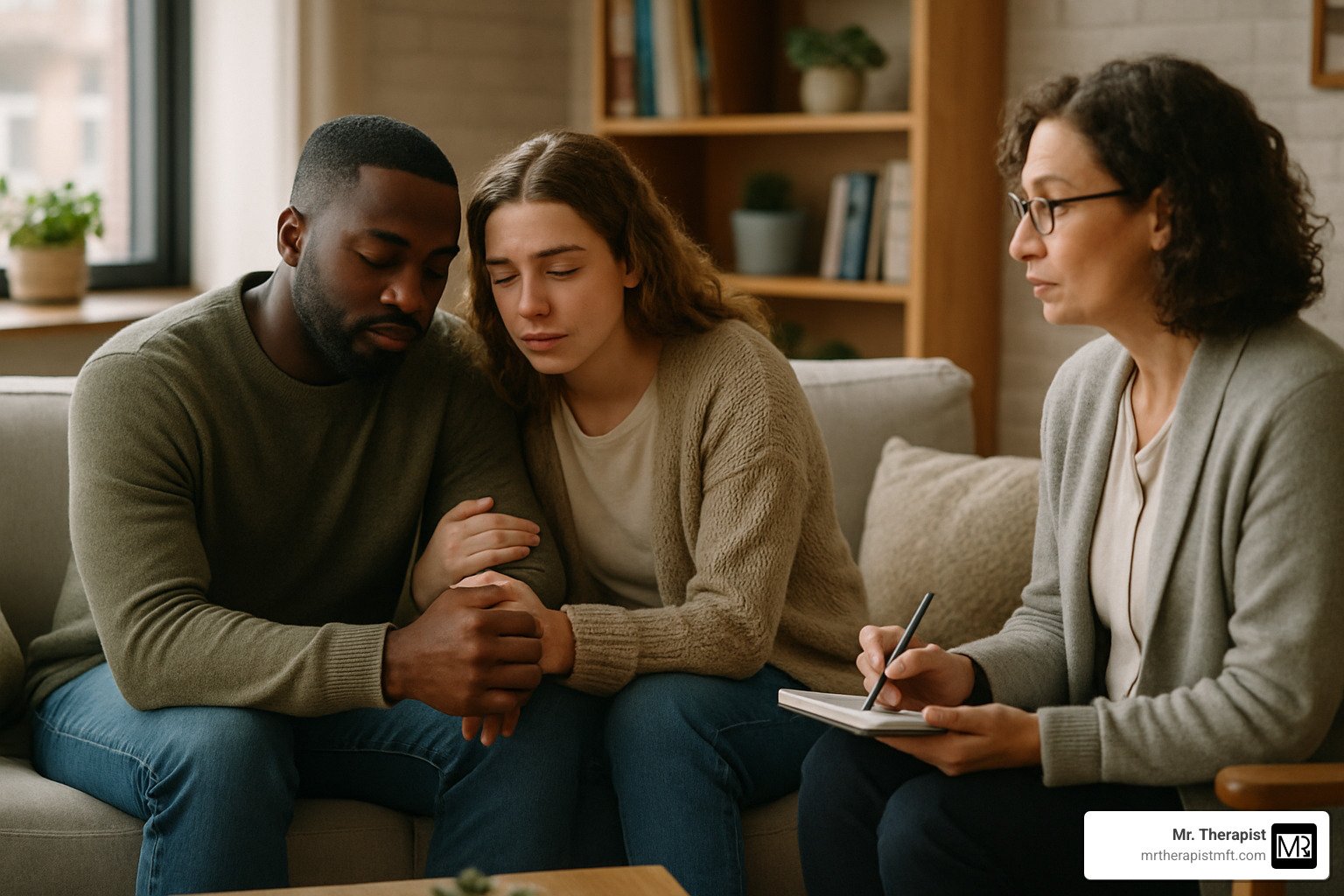
The Unique Challenge of Military Relationships
Couples counseling for veterans is specialized therapy that addresses the distinct challenges military couples face during and after service. If you’re looking for support options, here’s what you need to know:
- VA Medical Centers offer free couples counseling for veterans with no marriage requirement
- Vet Centers provide confidential counseling in a relaxed setting with staff who understand military culture
- Military OneSource offers up to 12 free sessions per issue for eligible service members and families
- Private nonprofit organizations provide no-cost options
Military relationships face unique stressors that civilian couples rarely encounter. From lengthy deployments and frequent relocations to the invisible wounds of combat trauma, the military lifestyle creates distinct relationship challenges that require specialized support.
“Military marriages have higher divorce rates than civilian marriages, driven in part by frequent moves, deployments, and resulting loneliness.” – Research indicates military divorce rates are 3.2% compared to 2.9% for civilians, with female service members experiencing even higher rates at 7%.
The strain doesn’t end when service does. Many veterans and their partners struggle with reintegration, communication barriers, and intimacy issues long after the uniform comes off. PTSD, depression, and other service-related conditions can create invisible walls between partners who deeply love each other but struggle to reconnect.
The good news? Effective help exists.
Over 75% of couples who participate in therapy report significant relationship improvements. For veterans and their partners, specialized counseling approaches can address the unique challenges of military life while building on the remarkable resilience these couples already possess.
I’m Emmanuel Romero, a Licensed Marriage and Family Therapist who has provided couples counseling for veterans through both the VA system and private practice, helping military families steer the complex transition from service to civilian life. My approach combines evidence-based techniques with a deep understanding of military culture to help couples rebuild connection after service.

Couples Counseling for Veterans: Understanding Your Options
Finding the right relationship support can feel overwhelming, especially after military service. The good news? You have several excellent options that understand the unique challenges you’ve faced together.
VA Medical Centers nationwide offer couples counseling through their mental health departments. If you’re enrolled in VA healthcare, you can access these services regardless of whether your partner served or whether you have a marriage certificate.
“You can receive couples counseling at the VA even if you’re not married and your partner is not a veteran,” a VA mental health provider recently shared with me. “The focus is on helping the veteran’s overall wellbeing, which includes supporting healthy relationships.”
Vet Centers provide a more relaxed alternative to traditional VA facilities. With over 300 locations across the country, these centers often feel more like a comfortable office than a government building. Many counselors are veterans themselves, creating an immediate sense of understanding that couples find incredibly valuable.
One veteran who received services told me, “Vet Centers initiated couples therapy services before the VA formalized them. The environment feels more like a private practice than a government facility.”
For those still serving or recently separated, Military OneSource offers non-medical counseling at no cost. This program provides up to 12 free sessions per issue for active duty, National Guard, Reserve members, and their families (including veterans within 365 days of separation). Sessions can happen in person, by phone, or through secure video calls.
Several nonprofit organizations have also stepped up to support military couples.
| Provider | Eligibility | Session Limit | Cost | Unique Features |
|---|---|---|---|---|
| VA Medical Centers | Veterans enrolled in VA healthcare | Varies by facility | Free (possible copays) | Integrated with other VA health services |
| Vet Centers | Combat veterans, MST survivors, bereaved family | No set limit | Always free | Relaxed setting, often veteran counselors |
| Military OneSource | Active duty, Guard, Reserve, families, recent veterans | 12 per issue | Free | Available 24/7, includes online options |
Primary Paths to Care for Couples Counseling for Veterans
Getting started with counseling typically follows one of these routes:
If you’re already receiving VA healthcare, simply ask your primary care provider for a VA referral to mental health services for couples counseling. When the VA can’t provide timely services or you live far from a facility, you may qualify for community care referrals to local providers.
Vet Center walk-ins are another straightforward option. These centers often welcome drop-ins or simple phone calls to begin services, with minimal paperwork and red tape.
For active duty members and families, DoD non-medical sessions are just a phone call away. Contact Military OneSource directly at 800-342-9647 to schedule, with no referral needed.
One veteran shared, “I was surprised how easy it was to get started. I called my local Vet Center, mentioned I was having relationship issues, and had an appointment that same week.”
For California residents looking for additional options, many community mental health centers offer affordable couples therapy with sliding scale fees based on your income.
Eligibility, Access & Cost
Finding the right couples counseling for veterans starts with understanding who qualifies for what services. The good news? Almost every military-connected couple has options, regardless of your relationship status, service history, or discharge type.
Who Qualifies for VA and Vet Center Couples Counseling?
If you’re a veteran enrolled in VA healthcare, couples counseling is available to you through VA medical centers. You qualify if you’re a combat zone veteran, experienced military sexual trauma, have service-connected conditions, or meet certain income requirements.
One common misconception is that both partners need to be veterans, or that you must be legally married. That’s simply not true. Your partner doesn’t need military experience, and unmarried couples—including same-sex partners—are equally welcome.
“The VA focuses on supporting the veteran’s wellbeing, and healthy relationships are a huge part of that,” explains one VA counselor I spoke with. “We don’t get caught up in paperwork definitions of what makes a ‘real’ relationship.”
Vet Centers operate under slightly different rules, serving veterans who served in combat zones, experienced military sexual trauma, provided drone operations or mortuary services, as well as family members of veterans who died on active duty and certain emergency responders.
Active Duty, Guard, and Reserve Options
Still serving? Active duty, National Guard, and Reserve members aren’t left out. You and your family can access:
- Military OneSource counseling with its 12 free sessions per issue
- Military and Family Life Counseling Program for short-term support
- Branch-specific relationship programs like Army Strong Bonds or Navy CREDO

Diagnosis Requirements: An Important Distinction
Here’s something crucial to understand: not all programs require a mental health diagnosis.
When you seek couples counseling through VA Medical Centers, it’s typically provided as part of your overall health plan. While you don’t always need a formal diagnosis, the counseling is often linked to your general wellbeing in documentation.
If you’re using Tricare coverage, couples counseling is only covered when it’s deemed medically necessary for a diagnosed condition—a higher bar to clear.
Many service members worry about career impacts from seeking help. That’s why programs like Military OneSource and Vet Centers offer “non-medical counseling” that requires no diagnosis and stays completely separate from your medical record. Research published in the National Library of Medicine shows these non-medical approaches still deliver significant benefits, reducing anxiety and improving relationship satisfaction.
Step-by-Step: Getting an Appointment
Ready to take that first step? Here’s how to get started:
For Military OneSource, simply call 800-342-9647 any time, day or night. They’ll answer 24/7 and can set you up with face-to-face, phone, or video counseling. You can also start a live chat on their website.
If you’re enrolled in VA healthcare, ask your primary care provider for a referral or contact your local VA’s mental health clinic directly. Not sure where to start? The VA’s “Coaching Into Care” support line (1-888-823-7458) can guide you through the process.
Vet Centers are perhaps the most approachable option. You can use their online center locator, call, or simply walk into your local center—no appointment necessary for that initial contact.
For those on active duty, find your installation’s support center through the Military and Family Support Center directory.
What Happens in Therapy: From Combat Stress to Connection

Walking into your first couples counseling for veterans session might feel intimidating. Many couples tell me they worried about being judged or having to relive painful memories. The reality is much more supportive – therapy creates a safe space where both of you can rebuild your connection after military service has tested your bond.
The First Session: Setting the Foundation
Your initial visit will feel more like a conversation than an interrogation. You’ll get comfortable with your therapist, share bits of your relationship story, and talk about what brought you in. Most therapists will ask about your military experiences, but only what you’re comfortable sharing.
“I was nervous about opening up,” one veteran client told me, “but our therapist made it clear we were in control of what we shared and when. That helped me relax.”
During this first meeting, you’ll identify what’s not working and what you hope to achieve. Some therapists use questionnaires to get a clearer picture of your specific challenges, which helps create a roadmap for your work together.
Common Focus Areas in Veterans’ Couples Therapy
Military service creates unique relationship challenges that civilian couples rarely face. Your therapy will likely address several key areas:
Communication barriers often develop during deployments or after trauma exposure. You’ll learn to express needs clearly and listen effectively, especially around difficult topics like combat experiences or PTSD symptoms.
Emotional reconnection becomes crucial after prolonged separations. Many couples describe feeling like “roommates” rather than partners after reintegration. Therapy helps rebuild the intimate bond that military service may have disrupted.
Role renegotiation is necessary when returning to civilian life. During deployments, partners develop independence and new routines. Finding a balanced “new normal” takes patience and understanding.
Trauma processing helps both partners understand how combat experiences or military sexual trauma affects your relationship patterns. This doesn’t mean reliving trauma, but rather recognizing its effects on current interactions.
As Dr. Lilian Dindo wisely notes when working with veteran couples: “If you have a pulse, you will have challenges in life. It’s how you respond to those challenges that matters.”
Evidence-Based Models Used With Veterans
The therapy approaches that work best for military couples have strong research backing their effectiveness:
Integrative Behavioral Couples Therapy (IBCT) has become the VA’s preferred approach because it balances acceptance with change. Rather than just teaching communication skills, IBCT helps couples accept emotional differences while building understanding.
Emotionally Focused Therapy (EFT) addresses the attachment injuries that deployments and trauma can create. At Mr. Therapist, we’ve seen remarkable results using Emotionally Focused Couples Therapy with veteran couples. EFT helps identify negative patterns and create new, positive emotional experiences that rebuild trust.
The PAIRS curriculum (Practical Application of Intimate Relationship Skills) cleverly transforms military skills into relationship tools. Used in the VA’s “Warrior to Soul Mate” program, it speaks to veterans in familiar language.
Measurable Benefits & Success Rates
The research on couples counseling for veterans shows impressive results for those who stick with it:
Over 75% of couples report significant relationship improvements after completing therapy. Nearly 90% experience better mental health, while about 65% report improved physical health – showing how emotional wellbeing affects your whole system. Importantly, 75% note better relationships with their children, creating a ripple effect of healing throughout the family.
“It saved my relationship,” one veteran told me after completing therapy. “We went from barely speaking to actually understanding each other again. I didn’t think that was possible.”
At Mr. Therapist, we’ve witnessed these changes firsthand. The combination of evidence-based techniques with a deep understanding of military culture creates a powerful healing environment for couples navigating the challenges of service and its aftermath.
Beyond the Couch: Online, Enrichment & Support Programs
The world of couples counseling for veterans has grown far beyond the traditional therapy office. Today’s military families can access support through video calls, weekend retreats, and mobile apps – perfect options when you’re dealing with busy schedules, distance challenges, or maybe just feeling a bit hesitant about formal therapy.

Digital & Telehealth Couples Counseling for Veterans
Virtual counseling has become a game-changer for many veteran couples:
VA Video Connect brings therapy right into your living room through the VA’s secure platform. Many veterans tell us they were surprised to find these virtual sessions can be just as powerful as sitting in an office together.
Military OneSource offers their 12 free counseling sessions via video too, making it possible to connect with a counselor even when deployments or moves make in-person meetings impossible.
The VA has also developed helpful mobile apps like Couples Coach that provide structured exercises you can work through together, either on your own or as a complement to therapy.
“I was skeptical about doing couples work through a screen,” admits one Army veteran. “But honestly, being in our own space actually made it easier to open up. Plus, no babysitter needed!”
For California veterans, we at Mr. Therapist offer secure telehealth sessions using Emotionally Focused Therapy interventions that translate beautifully to the online environment.
Relationship Enrichment vs Therapy
It helps to understand the difference between therapy and enrichment programs:
When you attend therapy, you’re typically working with a licensed mental health professional to address specific relationship challenges. The focus is often on healing emotional wounds and changing problematic patterns. It’s like rehabilitation for your relationship.
Enrichment programs, on the other hand, are more like relationship fitness training. They build skills and strengthen bonds that are already functional. These programs are often led by chaplains, peer mentors, or educators rather than therapists, and they don’t involve any diagnosis or medical record.
The military offers several popular enrichment retreats that veterans consistently praise:
Strong Bonds weekends give Army couples a chance to reconnect away from daily stresses. Picture comfortable hotel rooms, relationship workshops, and actual free time together – something many military couples rarely get!
CREDO retreats through the Navy combine relationship skills with spiritual elements for those who find faith an important part of their connection.
MarriageCare through the Air Force focuses on communication and conflict resolution in supportive group settings.
Warrior to Soul Mate weekends are VA chaplain-led retreats using the PAIRS curriculum to help couples rebuild emotional and spiritual connections.
Self-Help Resources

Between formal sessions, these tools can help maintain your momentum:
Military OneSource offers free relationship webinars you can watch anytime – perfect for those middle-of-the-night moments when you’re both finally awake and thinking about your connection.
The VA’s Relationship Spectrum tool helps couples honestly evaluate their relationship health in a non-threatening way.
AfterDeployment.org provides specific modules designed for that crucial post-deployment adjustment period when many couples struggle to find their rhythm again.
While these self-help resources are valuable, they work best as complements to professional guidance. As we often tell our clients at Mr. Therapist, think of these tools as “homework” that reinforces what you’re learning in therapy, rather than substitutes for the insights you’ll gain through facilitated conversations.
Crisis Support & Additional Resources
When relationship challenges become overwhelming, knowing where to turn can make all the difference. While couples counseling for veterans builds long-term relationship strength, sometimes you need help right now.
When to Seek Immediate Help – Couples Counseling for Veterans
Life doesn’t always wait for your next scheduled therapy appointment. Certain situations require immediate attention:
If you or your partner are experiencing thoughts of suicide, don’t wait – reach out immediately. The weight of military service, relationship struggles, and transition challenges can sometimes feel unbearable, but help is available 24/7.
When intimate partner violence occurs, safety becomes the priority. Whether it’s physical aggression, threats, or controlling behavior, these situations require immediate intervention. Many veterans and their partners don’t realize that the VA has specialized programs to address relationship violence.
Substance crises – including severe intoxication or withdrawal symptoms – often need medical attention before relationship work can continue. These situations can escalate quickly and may require professional support.
During acute PTSD episodes, including severe flashbacks or dissociation, a partner might need immediate stabilization. These moments can be frightening for both partners but are manageable with the right support.
“Relationship difficulties are prevalent among Veterans,” notes Dr. Lilian Dindo. “While stable relationships are a source of resilience, relationship distress is associated with depression, anxiety, and hopelessness.”
Emergency Resources for Veterans and Partners
When minutes matter, these 24/7 resources provide immediate support:

The Veterans Crisis Line offers immediate support for veterans and their loved ones. Simply call 988 and Press 1, text 838255, or chat online at VeteransCrisisLine.net. Trained responders – many of them veterans themselves – understand military experiences and can connect you with local resources.
For intimate partner violence concerns, the National Domestic Violence Hotline (1-800-799-SAFE) provides confidential support, while the VA’s Intimate Partner Violence Assistance Program offers specialized help through coordinators at every VA facility.
During substance emergencies, SAMHSA’s National Helpline (1-800-662-HELP) connects you with treatment options and immediate guidance.
For general support, Military OneSource (1-800-342-9647) provides 24/7 assistance from people who understand military life.
In California, our team at Mr. Therapist can connect clients with local crisis resources and collaborate with safety planning specialists when needed. We understand that sometimes the most important part of healing is knowing you’re not alone in the struggle.
Remember: Crisis support is the bridge that carries you to long-term healing. Reaching out isn’t giving up – it’s the first step toward reclaiming the connection you and your partner deserve.
Frequently Asked Questions about Couples Counseling for Veterans
Who is eligible for VA-funded couples sessions?
If you’ve been wondering about eligibility for VA couples counseling, you’ll be glad to know the options are quite inclusive. Veterans enrolled in VA healthcare can access these services through VA medical centers across the country.
Combat veterans, those who experienced military sexual trauma, veterans with service-connected conditions, and those who meet income thresholds are all eligible for this support.
Vet Centers operate under slightly different rules, providing services to combat veterans, MST survivors, drone operators, mortuary service providers, and family members grieving a service member who died on active duty.
“VA couples therapy does not require marriage or partner veteran status,” a VA provider recently shared with me. “The focus is on supporting the veteran’s wellbeing through healthier relationships.”
Do we have to be married or both Veterans?
Absolutely not! This is one of the most common misconceptions I hear from veterans considering couples counseling for veterans. The VA provides couples counseling regardless of marital status or whether both partners served. Same-sex couples, unmarried partners, and relationships where only one person is a veteran all qualify for these services.
One veteran I worked with explained it perfectly: “I was able to get couples counseling through the VA even though my partner is a civilian and we’re not married. What matters is that the relationship is important to my recovery.”
How many free sessions can we get through Military OneSource?
Military OneSource offers a generous 12 free non-medical counseling sessions per issue. What’s particularly helpful is that if a new issue arises, you may qualify for additional sessions. These sessions are flexible too – you can choose in-person meetings, phone calls, or secure video sessions based on what works best for your situation.

Does couples counseling affect my military career?
This concern keeps many service members from seeking help, but rest assured, confidentiality protections are strong. Non-medical counseling through Military OneSource and Vet Centers stays completely separate from your military records.
For VA couples counseling, while it may appear in your medical record that you’re participating in relationship counseling, the notes typically focus on your progress rather than specific relationship details.
As one mental health provider at the VA told me, “Most employers recognize that employees who get help when they need it are more productive and effective.” Seeking support is increasingly viewed as a sign of strength, not weakness.
What if my partner is reluctant to attend counseling?
Partner reluctance is incredibly common – you’re definitely not alone in facing this challenge. If your partner is hesitant, try these gentle approaches:
Begin with individual counseling yourself, then invite your partner to join later. Sometimes sharing educational materials about military relationships can help normalize the challenges you’re facing. You might suggest attending just a one-time “consultation” rather than committing to ongoing therapy.
Many couples find that military enrichment programs like Strong Bonds feel less clinical and more supportive. Sometimes framing attendance as supporting your recovery can be effective too.
A military family counselor I know puts it well: “Sometimes it helps to frame it as something you’re doing for yourself that you’d like their support with, rather than suggesting there’s something wrong with the relationship.”
Conclusion
Military relationships face challenges that civilian couples rarely encounter. The good news is that if you’re a veteran experiencing relationship stress, you don’t have to steer these waters alone. Multiple pathways to healing are available—many at no cost to you.
VA Medical Centers and Vet Centers understand the unique dynamics of military relationships. Their providers speak your language and recognize how deployment, combat exposure, and military culture shape your connection with your partner. Best of all, these services are typically free and designed specifically for veterans like you.
Military OneSource offers a practical solution with their 12 free non-medical counseling sessions per issue. This resource can be particularly valuable if you’re concerned about confidentiality or if you’re still serving.
When government resources aren’t the right fit, nonprofit organizations step in to fill the gaps, providing specialized relationship support without financial barriers.
Distance from quality care providers used to be a major obstacle for many veteran families. Today’s telehealth options have changed that reality, making expert guidance accessible even in remote locations or for those with mobility challenges.
For couples who aren’t ready for formal therapy, relationship enrichment programs offer a less clinical approach to strengthening your connection. These workshops and retreats build on the resilience and teamwork skills you developed in service.
The research is clear: healthy relationships significantly boost overall wellbeing and can actually protect against mental health challenges. When you’re navigating the often bumpy transition from military to civilian life, a strong partnership provides an anchor during stormy seas.
“Stable relationships are a source of resilience,” as Dr. Lilian Dindo points out. This is why relationship care isn’t a luxury—it’s an essential component of veteran healthcare.
At Mr. Therapist, we’ve seen how military service impacts couples. Our practice in San Clemente, California specializes in Emotion-Focused Therapy, an evidence-based approach that helps rebuild the secure emotional bonds that may have been strained by service-related separation or trauma.
Taking that first step toward help demonstrates the same courage that defines your military service. Your relationship deserves the same dedication you’ve shown in serving our country. Whether through VA services, military programs, or private support, investing in your relationship is investing in your future.
For California veterans seeking specialized relationship counseling, we offer a trauma-informed approach that honors your service while helping build the connection you and your partner deserve. Because after all you’ve given, you deserve a relationship that feels like coming home.



